We all know that using a solid keyword research strategy is crucial for search engine optimization. With so many ways to look at keywords, though, it can be hard to figure out which ones to focus on. In this guide, our agency breaks down our recommendations for keyword research and organization best practices.
By grasping a few fundamental principles surrounding keyword research and taking advantage of the best keyword research tools and services, you’ll soon find yourself ascending the Google rankings with confidence and ease.
Our Nashville SEO agency will show you how to organize keywords effectively, which will lead to more leads for your business.
Key takeaways
- Having a method for SEO keyword organization is paramount to optimize your search engine strategy and enhance your content performance.
- A meticulously structured approach to SEO research safeguards against keyword cannibalization and facilitates the seamless integration of latent semantic indexing (LSI) keywords into your content, which is crucial for search engine visibility and rankings.
- Prioritizing valuable keywords, in alignment with your business objectives, is instrumental in maximizing traffic and conversions, and this can be achieved with the expertise of an SEO keyword research services company.
- Organized keyword data serves as a beacon to illuminate valuable content opportunities and significantly improve your presence in search engines.
- By employing tier-based keyword rankings, you can pinpoint and concentrate on the most critical keywords within each cluster, thus optimizing your SEO efforts effectively through services provided by SEO keyword research agencies or companies specializing in SEO services for keyword research.
Why should you organize your SEO keywords?
At first glance, it might appear that saturating your content with relevant keywords is all it takes to rank well on search engines. However, the reality is more intricate. During your research, you’ll encounter diverse types of keywords, each with its unique performance characteristics.
Understanding the role and intent of each keyword is pivotal, prompting the need for meticulous organization.
It’s not merely about amassing keywords but comprehending their significance within the context of search engine results pages, Google Ads campaigns, and the ever-evolving search engine landscape.
To increase your chances of traffic
If you’re playing the stock market, you wouldn’t just purchase stock in one just one company. Why put your faith in one specific keyword?
Traffic equates to more opportunities to help answer questions for your visitors. More visitors provide more chances for leads and therefore more chances for sales.
The more keywords you give your website a chance to rank for the more you.
To avoid keyword cannibalization
By conducting thorough keyword research, you can identify the unique set of keywords that should be targeted by each page or piece of content, ensuring that they serve distinct purposes and reach specific segments of your audience.
This way, instead of having multiple pages that vie for the same search queries, you can strategically assign different but related keywords to each page. As a result, each page can achieve its fullest ranking potential, and your site as a whole can more effectively build topical authority.
To build topical authority
Keyword research is a critical tool for uncovering all the interconnected topics that relate to your main area of expertise.
By identifying these relevant keywords, you can create a comprehensive content strategy that covers not just your core topic, but also its subtopics and adjacent areas. This broad yet focused approach establishes your site or platform as a go-to resource, thereby building your topical authority.
The depth and breadth of your content, guided by keyword research, not only serves your audience’s diverse needs but also signals to search engines that you are an authoritative source in your field.
How our agency does keyword research?
At our agency, we take a meticulous approach to craft an effective topical map that forms the cornerstone of your SEO strategy. Our comprehensive, keyword explorer tool and solutions are powered by top-tier SEO keyword research tools, to ensure that no stone is left unturned in the keyword research process.
We understand the importance of keyword research and how they directly impact your online presence. By analyzing factors like monthly search volume, search intent, and related keywords, we uncover invaluable keyword data that guide your SEO strategy.
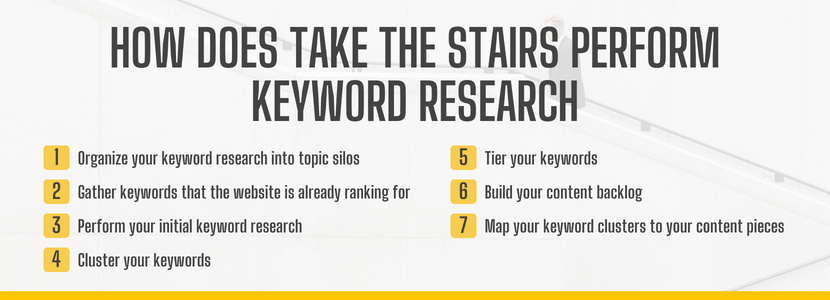
Organize your keyword research into topic silos
To effectively manage and implement your keywords, it’s essential to organize them into topic silos or SEO silos. This approach groups related keywords together, making it easier to plan and structure your content.
This topic silos need to be organized depending on how the business is structured. For example, if your business offers just one service (like pressure washing) but services dozens of locations it’s probably best for your topical map to structure keyword silos by city.
Common ways to organize your silos are:
- Services
- Location
- Features
- Product categories
- Industry
Keyword research companies can assist you in this organization process so that your keyword groups align with your content strategy and help improve your website’s search engine rankings. Properly organized keyword lists enhance your website’s relevance and user experience while aligning with your SEO goals.
Gather keywords that the website is already ranking for
This can be done with most SEO tools (e.g. Ahrefs, SEMrush, SEranking). You can pull any keyword you rank for in the top 100 searches nationally.
This provides a great starting place for your keyword research.
This will also help you establish branded keywords. These are keywords that relate to your business name, products, services, employees, and sometimes promotions.
Include these types of terms when you cluster your keywords.
Perform your initial keyword research
This is the first and foundational step in any SEO strategy. To effectively optimize your website for search engines and attract relevant traffic, you need to identify the keywords and phrases your target audience is using when searching online.
To do this, think of all the “seed keywords” someone might use if they were looking for the product or services you sell. Most keyword tools will show you keyword suggestions so it’s easy to find a large number of variations.
You can enlist the expertise of an SEO keyword research company or agency that specializes in SEO keyword research services. They employ various tools and techniques to discover new keywords relevant to your niche and industry.
Cluster your keywords
Clustering keywords involves grouping related search terms together to create a more organized and focused content strategy. This technique enables you to map out topics and subtopics, ensuring that each piece of content serves a specific purpose in your overall narrative.
By clustering keywords, you avoid the pitfall of keyword cannibalization, where multiple pages on your site compete for the same keyword. Each content piece targets a unique but related set of keywords, thereby maximizing the SEO potential of each page while enhancing your topical authority.
Keyword clustering also improves user experience by providing a more coherent and easy-to-navigate content structure. Users who find one piece of content useful are more likely to explore other content in the same cluster, thus increasing engagement and reducing bounce rates.
Tier your keywords
Decide which keywords are most important within each cluster.
Understanding the focus keyword, which we refer to as the Tier 1 keyword. Is the most important keyword for your content piece to rank for. It should be used in the H1 and the meta description without question. Adding the focus keyword throughout your piece, in your image alt text, and within your URL slug can also be beneficial.
You can learn more about tiering keywords below.
Build your content backlog
What good is keyword research without a place to implement it?
Your initial keyword research should help you put together a list of the most asked questions around each topic cluster which will certainly be a part of your content backlog but that will only take you so far if you’re looking to build topical authority.
Places to start your content research
- Competitor blogs – You have an opportunity for you to explain these topics more thoughtfully than they have.
- Popular forums – By visiting forum sites like Reddit and Quora, you can find even more FAQs on a topic when searching through their categories.
- AnswerThePublic – This tool uncovers what feels like every possibility for keywords to be a specific seed keyword.
- AI tools – While many people use large language models (LLM) like ChatGPT for writing, it can also be a great source for ideation. Provide as much detail as you can about the content you want to promote.
- Google Trends – If you think you’ve written everything possible on a topic, Google Trends can help you learn about new keywords on a subject when you review the Related Querries section on a search term you’ve entered.
Map your keyword clusters to your content pieces
The final step is to assign your keyword clusters to the content pieces in your content backlog. By carefully mapping your keyword clusters to your content pieces, you can create a cohesive and effective content strategy.
Map the clusters to the content pieces that are most relevant to the topic simply by assigning them to a field in your content backlog or topical map.
It’s crucial not to map a single keyword cluster to multiple separate content pieces, as this could lead to keyword cannibalization. Doing so dilutes the SEO value of each content piece, as they’ll end up competing against each other in search engine rankings, reducing the effectiveness of your overall strategy.
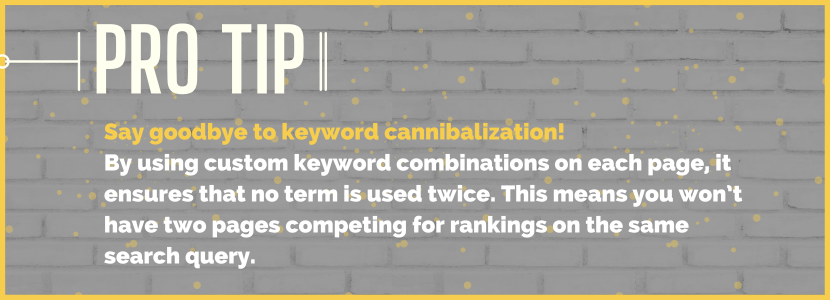
Also note, that it’s possible to map multiple keyword clusters to a single content page, especially if the topics are closely related and can be comprehensively covered in one piece.
If you run out of clusters, it’s time to do more keyword research. On most topics, you will eventually run out of mappable clusters. For these pieces, worry less about keywords and more about educating and entertaining your audience.
Keyword clusters
Grouping keywords by relevance is a fundamental aspect of any successful SEO strategy. An experienced SEO keyword research agency knows the significance of this process in achieving optimal search engine rankings.
By utilizing their expertise in keyword services and solutions, they can meticulously categorize keywords based on their thematic relevance to your business or content. This strategic organization ensures that your website addresses specific user intents effectively, improving user experience and search engine visibility.
SEO services keyword research experts understand that clustering keywords by relevance not only enhances your content’s clarity but also aids in crafting targeted, high-performing content that resonates with your audience and aligns with your overall SEO objectives.
Categorize keywords by topic or theme
Organizing keywords into hierarchical structures involves arranging them in a clear and structured manner. This hierarchical framework helps in content planning and website structuring.
Keywords are clustered based on their relevance and relationships, creating a logical and user-friendly navigation experience on a website. Collaborating with an SEO keyword research company or an SEO keyword research agency can streamline this process, ensuring that your content aligns with user intent and enhances search engine rankings.
Organizing keywords into hierarchical structures
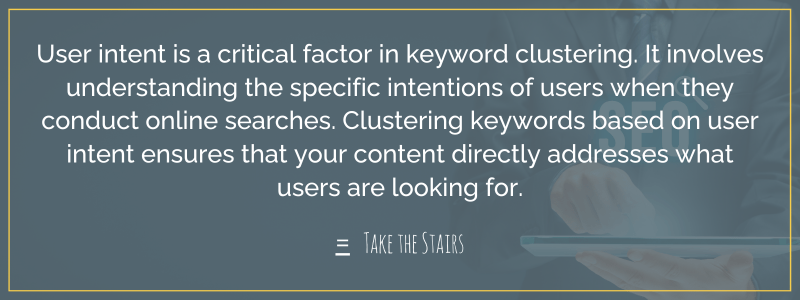
User intent is a critical factor in keyword clustering. It involves understanding the specific intentions of users when they conduct online searches. Clustering keywords based on user intent ensures that your content directly addresses what users are looking for.
For instance, informational, transactional, or navigational intent requires different content approaches. Proper consideration of user intent helps tailor your content to meet the specific needs and expectations of your target audience, improving user engagement and click-through rates.
Importance of understanding user intent in keyword grouping
User intent plays a pivotal role in keyword clustering strategies, and it’s a fundamental aspect that keyword research companies, such as those in Nashville, specializing in SEO keyword research services, prioritize.
This concept entails delving into the precise intentions of users when they embark on online searches. By categorizing keywords based on user intent, keyword services can ensure that your content directly aligns with users’ search objectives, whether they seek information, aim to make a transaction, or are navigating to specific content.
The thoughtful consideration of user intent not only tailors your content effectively but also enhances user engagement and click-through rates, ultimately driving the success of your online presence.
Grouping best practices
Effectively grouping keywords is a crucial component of any successful SEO strategy, and following best practices in this regard can make a substantial difference in your results. Here are some key guidelines to consider for topic clusters.
Try not to have too many or too few terms in a cluster
It’s advisable to strike a balance when clustering keywords. Having too few terms in a cluster can limit the relevance and reach of your content while having too many can make it challenging to remain coherent.
Typically, a cluster size of 3 to 12 terms is recommended. This range allows for specificity without sacrificing diversity, ensuring that your content remains engaging and informative for users in Nashville and beyond.
Terms clustered together should be very similar to one another
When creating keyword clusters, it’s essential to choose terms that are closely related and share similar meanings. This ensures that the content within each cluster maintains coherence and relevance to the topic or theme.
Keyword solutions that emphasize the semantic relationships between terms can help you identify which keywords belong in the same cluster. This approach not only improves the user experience but also boosts your SEO efforts by signaling to search engines that your content is comprehensive and relevant.
Spend a little extra time organizing your clusters up front will set you up for success down the line
While it may be tempting to rush through the keyword grouping process, investing extra time in the initial stages can yield significant long-term benefits. Well-structured keyword clusters serve as a strong foundation for content creation and website optimization.
They provide a roadmap for creating content that aligns with user intent, improving your search engine rankings, and ultimately satisfying users. Taking the time to organize your keyword clusters meticulously sets you up for success by ensuring that your SEO strategy is built on a solid and coherent structure.
By following these best practices and considering user intent for your SEO strategy, you can create well-structured keyword solutions that enhance your online visibility and drive targeted traffic to your website. An SEO keyword research agency or keyword research companies in Nashville are valuable partners in implementing these strategies effectively.
Keyword Tiers
Criteria for keyword tiering
When it comes to SEO keyword organization, specific criteria play a pivotal role. Firstly, a thorough keyword research process, utilizing tools like Google Keyword Planner, is essential to identify high-value keywords tailored to your niche and the Nashville SEO landscape.
Collaborating with a dependable SEO keyword research company ensures that this endeavor is conducted effectively. Once you have your selected keywords, a strategic arrangement is crucial, taking into account factors such as search intent, competition, and relevance.
A well-executed keyword organization serves as the foundation of a successful SEO strategy, ultimately enhancing your online visibility and driving precisely targeted traffic to your website.
Search volume
Essentially, search volume is the pulse of public interest. It tells you loud and clear what folks are actively hunting for online.
If you’re wondering how the general population labels or describes the solutions you’re offering, just look at those high-search volume keywords. They’re not just popular search terms; they’re actually how your audience thinks and talks about the problems you can solve for them.
Navigating by search volume helps you tap into that demand, allowing you to use the very language your audience uses. This way, you’re not just throwing content into the void; you’re answering the questions people are actually asking, using the terms they get. So, use search volume as your compass—it points you toward what people genuinely want to know about.
Intent to purchase
In addition to narrowing down your audience to searchers with more specific queries, our agency thinks it’s helpful to keep searcher intent in mind when choosing a keyword.
For example, the broad keyword “dog walker” can be broken down into more specific keywords based on what the person is trying to find.
- “What is a dog walker?”
- “Dog walker salary”
- “Dog walker services in Nashville, TN”
Can you see how different the intent of each of the above searches is? If you’re a dog walker in Nashville hoping to attract clients, you’ll have the most conversions by using the third option on the list because it shows intent to purchase right now.
Low competition
No matter what keyword you choose, you’re going to be competing against other businesses for ranking. The key is deciding which battles to fight.
For example, say you’re deciding between two keywords. Both have high search volumes and show high intent to purchase. If the only difference between the two is ranking and keyword difficulty, it makes sense to go with the easier of the two.
When researching competition grades for your keywords, tools like the following can be invaluable:
- Moz Pro
- Ubersuggest
- Ahrefs
- SeRanking
Keep in mind that the above list of keyword tools is only a small sample of all the keyword ranking tools out there.
Now that you have an idea about which criteria to select in your keyword and clustering strategy, you’re ready to start making decisions about which keywords to focus your efforts on.
Our agency uses a tier-based model for each keyword cluster. Implementing tier-based keyword rankings is a strategic approach to optimizing your SEO efforts, especially in a competitive landscape like Nashville.
Here’s how our agency breaks down keyword clusters.
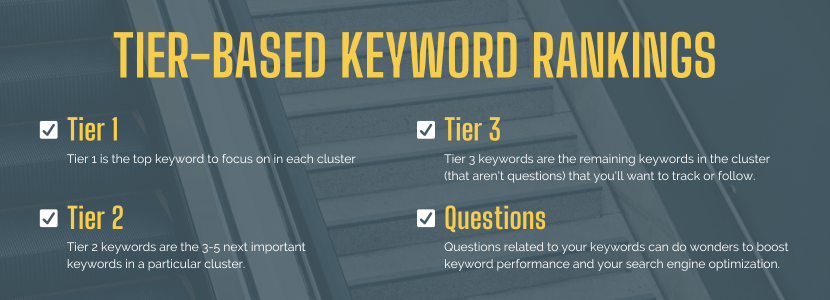
Tier 1 keywords
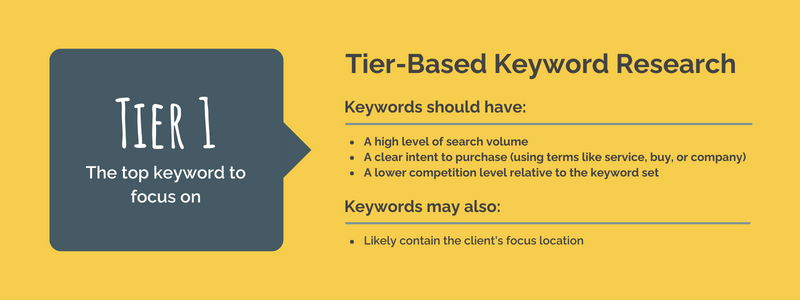
Tier 1 is the top keyword to focus on in each cluster.
The tier 1 keyword should have a high search volume and show a clear internet to purchase by using terms like service, buy, or company. It will also be less competitive relative to its keyword set.
The tier 1 keyword will usually contain a focus location.
Tier 2 keywords
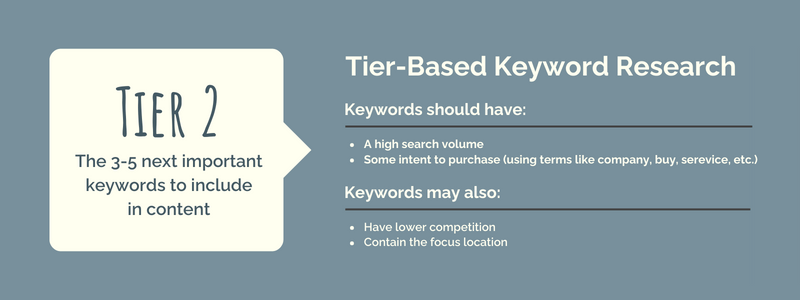
Tier 2 keywords are the 3-5 next important keywords in a particular cluster.
Tier 2 keywords should have a high search volume and show some intent to buy by using words like service, buy, or company.
They may also be less competitive and contain a focus location.
Tier 3 keywords
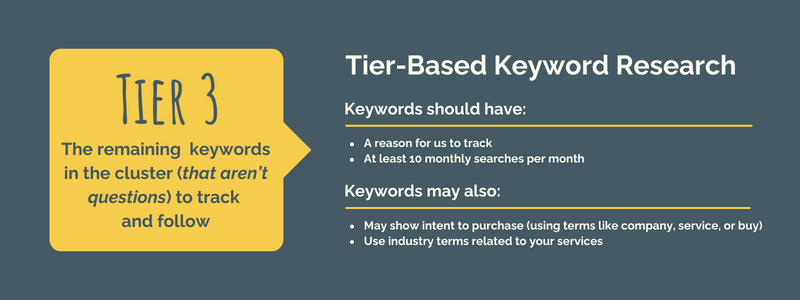
Tier 3 keywords are the remaining keywords in the cluster (that aren’t questions) that you’ll want to track or follow.
They’ll have at least ten searches per month and may show intent to purchase or use industry terms related to your services.
Questions
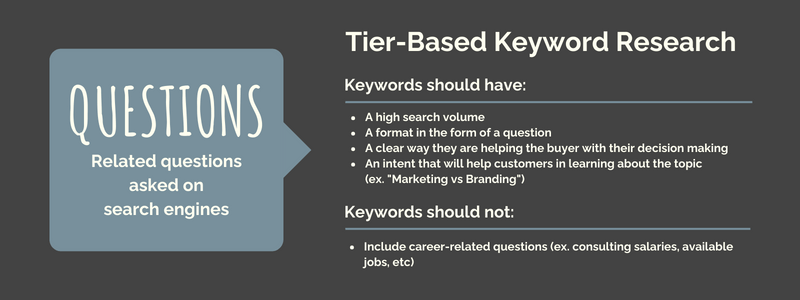
Questions related to your keywords can do wonders to boost keyword performance and your search engine optimization.
These should almost always be in a question format and have a relatively high search volume on search engines. Other potential keywords to put in the question category show intent for learning about the topic. For example, “Marketing vs Branding”.
We recommend categorizing these terms separately so you can still track their ranking progress. Make sure to add these to your content backlog and/or topical map. These keywords should be mapped to the content pieces in which they are answered.
The benefits of using a tiered-based organization technique for keyword research
Implementing a meticulous keyword organization technique offers several notable benefits in optimizing your SEO strategy. By using reliable keyword research tools and following a structured keyword research process, you can capitalize on these advantages.
Organized keywords allow for a more focused approach to content creation and optimization, aligning your SEO strategy with user search intent. This, in turn, increases the chances of your content ranking higher in search engine results pages, which is particularly valuable for Google Ads campaigns.
Moreover, well-organized keyword data helps identify valuable long-tail keywords with lower competition, potentially reducing keyword research services costs.
Overall, this technique empowers you with precision and insights, making it easier to craft compelling content, enhance search engine visibility, and harness the full potential of your SEO efforts, as evidenced by Google Analytics data and monthly search volume metrics.
Stops keyword cannibalization from occurring
Keyword cannibalization occurs when multiple pages or pieces of content on your website target the same or very similar keywords. When this happens, search engines like Google can become confused about which page to rank for a particular keyword.
As a result, none of your pages perform as well as they could in search engine results pages (SERPs). This dilution of SEO efforts can lead to lower rankings and reduced visibility for your content.
In highly competitive fields like keyword research, where many websites are vying for top positions in search results, avoiding keyword cannibalization is pivotal. By ensuring that each keyword is used strategically and uniquely within your content, you can maximize the chances of individual pages ranking well for their intended keywords.
To achieve this, it’s essential to research keywords thoroughly using the best keyword research tools available. These tools help you identify which keywords are most valuable, what their search volume is, and what their keyword difficulty is (how hard it is to rank for them).
By carefully selecting and allocating keywords to specific pages or pieces of content, you can avoid keyword cannibalization and optimize your content’s performance in SERPs.
Ensures the latent semantic indexing (LSI) keywords are implemented throughout your text
The integration of latent semantic indexing (LSI) keywords into your content is a strategic approach that plays a pivotal role in enhancing your website’s visibility and search engine rankings. LSI keywords are terms and phrases related to your primary keywords that provide additional context and relevance to your content. Here’s a more detailed explanation of how this process works using relevant keywords:
A systematic keyword research approach, facilitated by keyword research tools and keyword analysis, empowers you to identify not only your primary keywords but also a set of LSI keywords that are semantically related. These LSI keywords are crucial for enriching your content and helping search engines better understand the context and relevance of your material.
For instance, if your primary keyword is “digital marketing strategy,” LSI keywords could include phrases like “online advertising techniques,” “content marketing strategies,” or “social media optimization.” By strategically incorporating these LSI keywords throughout your text, you provide a more comprehensive and contextually relevant perspective on your topic.
Helps you prioritize the most valuable keywords in your content strategy
Prioritizing keywords in your content strategy is a critical step that requires a keen understanding of your target audience and specific business objectives. It involves a careful selection process to ensure that your SEO efforts are aligned with your digital marketing goals and the interests of your audience. Here’s a more detailed explanation of how this works, incorporating relevant keywords:
To prioritize keywords effectively, it’s crucial to first filter out irrelevant keywords. These are terms that may have a high search volume but are not directly related to your content or business objectives. SEO tools and keyword analysis play a crucial role in identifying and weeding out such irrelevant keywords.
Once you’ve refined your keyword list, you can prioritize keywords based on several factors, including their relevance to your content, the presence of SERP features, and their potential to attract organic traffic and conversions.
By aligning your content strategy with these prioritized keywords, you ensure that your SEO efforts are focused on targeting the most valuable and relevant terms. This strategic approach not only helps in driving organic traffic but also in increasing the likelihood of achieving your digital marketing objectives, such as lead generation or product sales.
Highlights valuable content opportunities
Keyword research and analysis is a pivotal aspect of refining your content strategy that will help you to determine valuable content opportunities. This keyword research process involves utilizing various SEO tools and techniques, including keyword planners, Google Keyword Planner, and competitive research tools, to conduct in-depth research on relevant search terms.
Here’s a more detailed explanation about incorporating these keywords:
Keyword research, particularly using tools like Google Keyword Planner, is a comprehensive process that entails analyzing search terms and phrases to identify those with the highest potential for generating organic traffic. This research extends beyond simply identifying keywords; it involves analyzing keywords that align with your content goals and target audience’s search intent.
Conducting this level of in-depth research can be time-consuming, as it requires a thorough understanding of the competitive landscape and user behaviors. Competitive research tools play a significant role in uncovering which keywords your competitors are targeting successfully.
Schedule a meeting to learn more about our SEO keyword research services
 Is your small business seeking assistance with its keyword strategy? Our agency is here to provide expert guidance. While we are headquartered in Nashville, TN, our keyword solutions and SEO expertise are accessible to clients nationwide.
Is your small business seeking assistance with its keyword strategy? Our agency is here to provide expert guidance. While we are headquartered in Nashville, TN, our keyword solutions and SEO expertise are accessible to clients nationwide.
As a reputable SEO keyword research company, we are ready to provide keyword solutions that will elevate your online presence and drive targeted traffic to your website.
Contact Us if you’re ready to get started with a free consultation.










